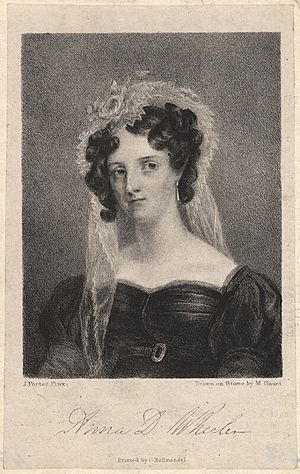Anna Wheeler (author) facts for kids
Quick facts for kids
Anna Wheeler
|
|
|---|---|
 |
|
| Born | c. 1780 |
| Died | 1848 |
| Nationality | Anglo-Irish |
| Occupation | Writer and supporter of women's rights |
| Spouse(s) | Francis Massey Wheeler |
| Children | Rosina Bulwer Lytton |
Anna Wheeler (born around 1780 – died 1848) was an Irish writer. She was a strong supporter of equal rights for women. She also believed in the benefits of education for everyone.
Anna was born Anna Doyle. She married Francis Massey Wheeler when she was about 16. They separated twelve years later. After her husband passed away, she earned money by translating books by French thinkers.
She knew famous people like Robert Owen and Jeremy Bentham. The philosopher William Thompson even said his book about women's rights was a "joint property" of him and Anna.
Early Life and Learning
Anna Doyle was the daughter of a clergyman named Rev. Nicholas Milley Doyle. He was a priest in the Church of Ireland. Anna did not go to a formal school. Instead, she learned French, geography, reading, and writing at home.
In 1795, when she was about fifteen, she married Francis Massey Wheeler. He was the heir to a large estate. They lived in County Limerick. Anna and Francis had at least two daughters. One of them, Rosina Doyle Wheeler, later became a famous writer. Her name was Rosina Bulwer Lytton.
Anna loved to read many books. She studied the ideas of French thinkers from the Age of Enlightenment. She also read the works of Mary Wollstonecraft, who was an early supporter of women's rights. In 1815, Anna moved to London. She wanted her daughters to get a good education there. She also traveled through France starting in 1816.
Anna had a brother named Sir John Milley Doyle. He was a commander in the British and Portuguese armies. He fought in important wars like the Peninsular War.
Working for Women's Rights
Anna's husband died in 1820. This left her without money. So, she started translating books into English. She translated works by Charles Fourier and other thinkers. These were people who believed in fair societies. Anna spent her life traveling and sharing ideas about women's rights. She lived in London, Dublin, Caen, and Paris.
In London, she met many important people. These included Robert Owen, Jeremy Bentham, and Frances Wright. She became very good friends with William Thompson. In 1825, a writer named James Mill said women should not have political power. This made Thompson write a book called Appeal of One Half of the Human Race, Women. This book argued against men keeping women from having political and civil rights. Thompson said this book belonged to both him and Anna Wheeler.
Anna Wheeler was one of the first women to speak publicly in England. She spoke about women's rights at meetings. She often spoke at the South Place Chapel. This was a place where people with new ideas gathered. In 1829, she gave a speech called "The Rights of Women." In this speech, she showed why arguments for men being better were wrong. She encouraged women to work together. She wanted them to create an organization. This group would help women get rid of unfair rules. It would also help create equal education for boys and girls.
Anna was a strong supporter of women's political rights. She also believed in equal chances for education. She was friends with French feminists and socialists. These included Flora Tristan and Desirée Veret. In the early 1830s, she helped start a journal called La Tribune des femmes. Other friends included Henri Saint-Simon and Charles Fourier.
In 1833, William Thompson passed away. He left Anna an annuity of £100. This was enough money for her to live comfortably.
Later Years and Family
Anna Wheeler became ill in the 1840s. Because of her health, she had to stop her public work. She died on May 7, 1848, in London. She had even turned down invitations to join the revolution in France that year.
Anna's daughter, Rosina Bulwer Lytton, became a novelist. She was also a strong public speaker. Anna's grandson, Robert Bulwer-Lytton, 1st Earl of Lytton, became the Viceroy of India. This was a very important position. Two of her great-grandsons also became Earls of Lytton.
One of Anna's great-granddaughters was Lady Constance Lytton. She followed Anna's example. She became a leading suffragette. Suffragettes were women who fought for the right to vote. Lady Constance was a protester, went on hunger strikes, and was a writer.
See also
- History of feminism
 | Percy Lavon Julian |
 | Katherine Johnson |
 | George Washington Carver |
 | Annie Easley |

